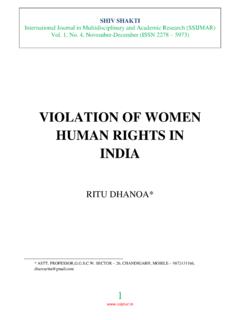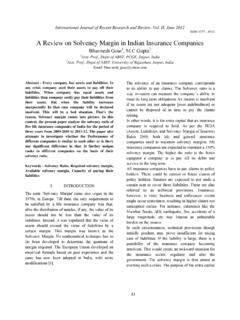Transcription of ROLE OF INSURANCE REGULATORY AND …
1 SHIV SHAKTI. International Journal in Multidisciplinary and Academic Research (SSIJMAR). Vol. 1, No. 4, November-December (ISSN 2278 5973). ROLE OF INSURANCE REGULATORY AND. development authority IN INDIAN INSURANCE . SECTOR. Dr. H H Bharadi*. Abstract INSURANCE REGULATORY and development authority (IRDA) is an autonomous apex statutory body which regulates and develops the INSURANCE industry in India. It was constituted by a parliament of India act called INSURANCE REGULATORY and development authority Act, 1999 and duly passed by the government of India .The agency operates its headquarters at Hydrabad, Andhra Pradesh where it shifted from Delhi in 2001. Promote and ensure orderly growth of the INSURANCE business and re- INSURANCE business.
2 IRDA issue the applicant a certificate of registration, renew, modify, withdraw, suspend or cancel such registration and Protect the interests of the policy holders in matters concerning assigning of policy, nomination by policy holders, insurable interest, settlement of INSURANCE claim, surrender value of policy and other terms and conditions of contracts of INSURANCE . Further, it regulates investment of funds by INSURANCE companies, regulating maintenance of margin of solvency, adjudication of disputes between insurers and intermediaries or INSURANCE intermediaries. Keywords: IRDA, INSURANCE density and penetration, and claims. *. Assistant Professor, Deportment of Studies in Economics, Rani Channamma University, Belagavi 5911 56, E-mail: hhbharadi Mobile: 9448866674.
3 1. Role of INSURANCE REGULATORY and development authority in Indian INSURANCE sector Introduction The IRDA Act, 1999 was passed as per the major recommendation of the Malhotra Committee report (1994) which recommended the establishment of an independent REGULATORY authority for INSURANCE sector in India. Later, it was incorporated as a statutory body in April, 2000. The IRDA Act, 1999 also allows private players to enter the INSURANCE sector in India besides a maximum foreign equity of 26 per cent in a private INSURANCE company having operations in India. Considering some of the emerging requirements of the Indian INSURANCE industry, IRDA was amended in 2002. As stated in the act mission of IRDA is "to protect the interests of the policyholders, to regulate, promote and ensure orderly growth of the INSURANCE industry and for matters connected therewith or incidental thereto.
4 " Indian INSURANCE industry is regulated by the terms and conditions of the IRDA. Indian law has certain expectations from the IRDA to perform in the Indian INSURANCE industry. IRDA should protect the interest of policyholders by ensuring fair treatment by the INSURANCE companies. The growth of INSURANCE companies in a speedy and orderly manner should be taken care by the IRDA. It should monitor and implement quality competence and fair dealing of the INSURANCE companies in the industry. IRDA should make sure that the insurers are providing precise and correct information about the products offered by them for the INSURANCE customers. IRDA should also ensure speedy settlement of genuine claims of the policyholders and prevent malpractices in the process of claims settlement.
5 IRDA controls all the INSURANCE business in India. They are setting structure and boundaries for the INSURANCE companies to act upon. Starting from licensing to approving the products, IRDA directs the companies in India. They also protect customer interests in the country. As per current guidelines issued by IRDA, INSURANCE Companies are not permitted to invest in Indian Depository Receipts (IDR), while they are permitted to invest in Equity shares/. Bonds/ Debentures. IRDA needs to remove this disparity to open up investment opportunity by INSURANCE Companies and thereby also enhance the liquidity of IDRs (Contributed by Sanjay Banka, FCA FCS) Hence, the present work made an attempt to study the Role of IRDA in Indian INSURANCE sector.
6 2. Objectives of the study- following are the main objectives of the present study. 1. To know the powers and functions of the IRDA. 2. To study the impact of IRDA on the growth of life and non-life insurers in India. 3. To examine the impact of IRDA on INSURANCE penetration, density, policies issued and claims settlements METHODOLOGY. The present work entitled Role of IRDA in Indian INSURANCE sector is based on secondary data. The sources of data were collected from annual reports of the IRDA, LIC, RBI. Bulletins, Economic surveys and other annual reports of the non-banking financial institutions. The data collected for the study were processed and analyzed by using suitable statistical technique. The study covers the period from 2001-02 to 2010-11.
7 THE MAIN FUNCTIONS OF IRDA. The duties, powers and functions of IRDA are laid down in section 14 of IRDA Act, 1999 as: To regulate, promote and ensure orderly growth of the INSURANCE business and re- INSURANCE business. Issue to the applicant a certificate of registration, renew, modify, withdraw, suspend or cancel such registration. To Protection of the interests of the policy holders in matters concerning assigning of policy, nomination by policy holders, insurable interest, settlement of INSURANCE claim, surrender value of policy and other terms and conditions of contracts of INSURANCE . To Specifying requisite qualifications, code of conduct and practical training for intermediary or INSURANCE intermediaries and agents and Specifying the code of conduct for surveyors and loss assessors.
8 3. To Control and regulation of the rates, advantages, terms and conditions that may be offered by insurers in respect of general INSURANCE business not so controlled and regulated by the Tariff Advisory Committee under section 64U of the INSURANCE Act, 1938 (4 of 1938). To Regulating investment of funds by INSURANCE companies, regulating maintenance of margin of solvency, adjudication of disputes between insurers and intermediaries or INSURANCE intermediaries Specifying the percentage of premium income of the insurer to finance schemes for promoting and regulating professional organizations referred to in clause and Specifying the percentage of life INSURANCE business and general INSURANCE business to be undertaken by the insurer in the rural or social sector RESULTS AND DISCUSSIONS.
9 Registered Insurers in India At end of September 2011, there are forty-nine INSURANCE companies operating in India; of which twenty-four are in the life INSURANCE business and another twenty-four are in general INSURANCE business. In addition, GIC is the sole national re-insurer. Of the forty-nine companies presently in operations, eight are in the public sector: two specialized insurers, namely ECGC. and AIC, one in life INSURANCE , four in general INSURANCE and one re- INSURANCE . The remaining forty one companies are in the private sector. Table: 1 Registered Insurers in India (as on 30th September 2011). Types of business Public sector Private sector Total Life INSURANCE 1 23 24. General INSURANCE 6 18 24.
10 Re- INSURANCE 1 0 1. Total 8 41 49. Source; IRDA Annual reports, various issues Table: 2 INSURANCE Companies Operating In India 4. LIFE INSURERS. Public Sector Private Sector 1 Life INSURANCE Corporation of India Aegon Religare Life INSURANCE Co. Ltd 2 Aviva Life INSURANCE Co. Ltd 3 Bajaj Allianz Life INSURANCE Co. Ltd 4 Bharti AXA Life INSURANCE Co. Ltd 5 Birla Sun Life INSURANCE Co. Ltd. 6 Canara HSBC OBC Life INSURANCE Co. Ltd 7 DLF Pramerica Life INSURANCE Co. Ltd. 8 Edelweiss Tokio Life INSURANCE Co. Ltd. 9 Future Generali Life INSURANCE Co. Ltd. 10 HDFC Standard Life INSURANCE Co. Ltd. 11 ICICI Prudential Life INSURANCE Co. Ltd. 12 IDBI Federal Life INSURANCE Co. Ltd. 13 ING Vysya Life INSURANCE Co.










